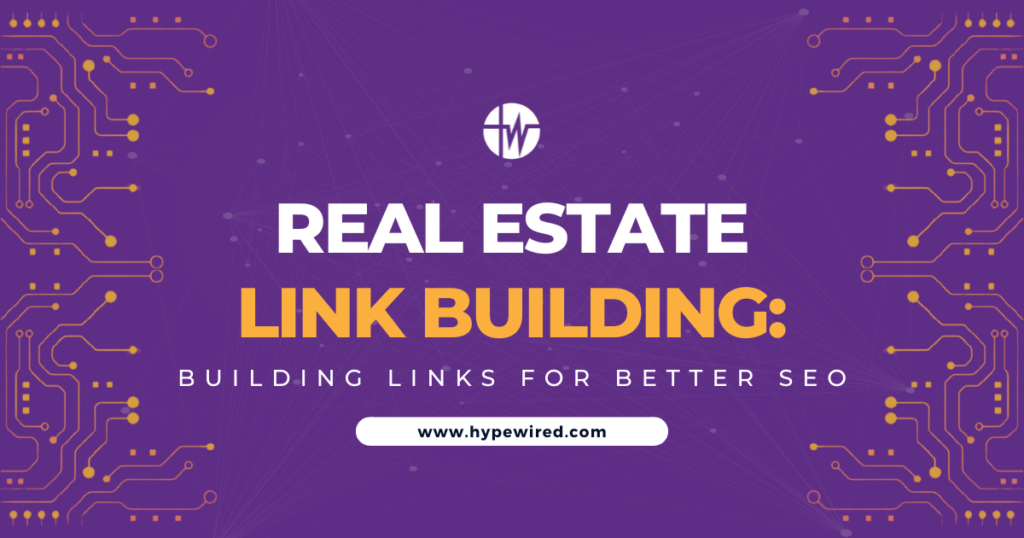Real estate link building is essential to any successful SEO strategy for real estate websites. Creating a web of connections that point to your website can help boost its visibility and authority in the eyes of search engines like Google. In this guide, we’ll explore what link building is, how to build links effectively for real estate websites, common mistakes to avoid when doing so, and measuring the success of your efforts. Get ready—it’s time to learn about real estate link building.
What is Link Building?
Link building is the process of creating links from one website to another. It’s an important part of SEO (search engine optimization) and can help improve a website’s visibility in search engine results pages (SERPs). Link building involves creating relationships with other websites, usually through content promotion or outreach activities. The goal is to get other sites to link back to your site, thus increasing its authority and ranking in SERPs.
Link building can create a sense of reliability between webpages and their guests, aiding in the development of trust. When a website has more quality links pointing back to it, this signals to search engines that the site is reliable and trustworthy.
There are several kinds of links that can point back to a page, and they affect rankings in different ways:
- Internal linking (linking within one’s own website),
- External linking (other websites linking back to the page),
- Sponsored links (paid-for placement on other sites),
- Nofollow links (links that don’t convey authority to Google crawlers, but can to human readers),
- Contextual/editorial placements (integrating natural-looking editorial text with promotional material),
- Guest posts/blogger outreach campaigns (writing content for another blog or website while including a link back), and
- Directory submissions (adding business details into web directories such as Yelp or Yellow Pages).
Put simply, these tactics help build trust between websites and their visitors, which may result in higher rankings in SERPs for relevant keywords, increased traffic, and improved conversion rates.
Link building requires careful planning and research, but when done correctly, it can be extremely beneficial for businesses looking to increase their visibility online—especially those operating within highly competitive industries such as real estate.
How to Build Links for Real Estate Websites
Constructing quality connections to your website can enhance your presence in the SERPs and drive more natural traffic, but irrelevant or low-quality links can hurt more than they help. Here are some tips for building links that will help boost your rankings and bring more leads to your business.
Create link-worthy content. Original research is one of the most successful ways to get other sites to link to your content, but thorough, helpful, and relevant content is far more likely to pick up organic backlinks than thin content that doesn’t say much of note.
Partner with sites in related industries. Avoid building links that could direct traffic toward your direct competitors. Instead, look for opportunities with businesses like home inspectors and mortgage companies that have similar target audiences but different services.
Carefully vet your opportunities. Traffic from backlinks is only useful if it boosts your site authority or leads to conversions, so carefully consider which outreach opportunities you pursue.
Creating Quality Content for Link Building:
Once you have identified potential link sources, it’s time to create content that will attract those links naturally. This could include blog posts about current trends in the real estate market or helpful guides about buying or selling a home. Ensure that the material is crafted with quality and provides value, so it can be shared by people in their circles and linked to from other websites.
After creating quality content, you need a plan for getting it out there so people can find it easily online; this is called an outreach and promotion strategy. Reach out directly via email or social media channels with personalized messages asking them if they would be willing to share or feature the article on their website. This could take the form of offering a journalist an interesting piece of new research to build a story off of and linking back to you for credit, for example. Another way to go about this is to research a potential link source and offer to write a guest post that covers a topic they haven’t written about yet, linking to an article on your site in the process.
Building links for real estate websites is a complex process that requires research, strategy, and careful execution. Yet, with the correct methodology, it can be accomplished effectively and deliver excellent outcomes.
Common Mistakes to Avoid When Building Links for Real Estate Websites
When pursuing backlinks for real estate sites, it’s important to keep your critical thinking skills sharp. Not researching your target audience is one of the biggest blunders you can make. To maximize success, you need to know what people want to know, who you’re going to pursue a backlink from, and why they should accept. Without this insight, developing content that wins backlinks is all but impossible. You wouldn’t want to pitch a DIY plumbing guide to a plumbing company, for example—it’s not in their best interests to promote it.
Another mistake is focusing on quantity over quality when it comes to links. It’s not sufficient to simply accumulate numerous links; they should also be from reputable sources in order for them to generate traffic and boost SEO rankings. Aiming too low in terms of quality is simply a wasted effort if the link won’t help improve visibility or conversions.
Finally, make sure you’re diversifying your link sources. If all of your backlinks come from the same type of website (e.g., blogs), then search engine algorithms may view this as suspicious activity and penalize you accordingly by lowering rankings or removing pages altogether from their indexing process. To ensure maximum effectiveness, aim for a mix of different types of sites, such as industry publications, directories, social media platforms, etc., so that no single source dominates the profile too heavily and looks unnatural in Google’s eyes.
Measuring the Success of Your Real Estate Link Building Efforts
Measuring the success of your real estate link building is an essential part of ensuring that your website remains competitive in today’s digital landscape. Setting goals and tracking progress are key to understanding how effective your link building strategy has been, while analyzing traffic sources and referrals will help you determine which tactics have been most successful. Finally, evaluating the quality of inbound links will give you a better idea of whether or not they’re having a positive impact on your website rankings.
Setting Goals and Tracking Progress:
Establishing realistic goals for your link building campaign is critical to its success. Make sure that these objectives are measurable so that you can track progress over time. Some common metrics used by real estate agents include the total number of backlinks acquired, the percentage increase in organic search engine rankings, average monthly visitors from referral sites, etc. Regularly tracking the metrics will let you know whether your objectives are being met.
Analyzing Traffic Sources and Referrals:
It’s important to understand where visitors to your site are coming from so that you can adjust your approach accordingly. Analyzing traffic sources, such as social media platforms, blogs, forums, directories, etc., will provide insight into which strategies have worked best for attracting new customers or leads. Additionally, examining referral data like referring domains or anchor text associated with each link can also provide valuable insights into what content resonates with potential clients or partners who may be interested in linking back to your site.
Evaluating the quality of inbound links is essential when it comes to SEO ranking factors. It’s important to ensure that these links come from reputable websites with high domain authority scores (DA) and page rank (PR). Checking out their DA score and PR provides useful information about how much weight Google assigns them when determining search engine result pages. If your site has acquired a large number of low-quality or spammy backlinks, they should be rectified as soon as possible, as this could negatively affect overall performance and even lead to penalties from Google if left unchecked for too long. If you can’t get the backlinks removed, it’s also possible to disavow backlinks to Google.
Real Estate Link Building FAQs:
What are link building articles?
Link building articles are pieces of content that link to other relevant pages, such as guest posts that link back to the writer’s site, or that are designed to attract organic backlinks and are posted on the writer’s site. These articles can be employed in SEO campaigns to enhance a website’s visibility on SERPs.
What is the importance of link building in real estate?
Creating links from other relevant websites is essential to any successful real estate marketing strategy, as it boosts visibility and drives organic traffic to your website, leading to more lead-generation opportunities. By creating high-quality links from other relevant websites, you can create a strong web presence to help potential clients find your business online. Additionally, link building also helps build trust with search engines like Google, which in turn boosts rankings and increases the likelihood of appearing in searches related to real estate services.
Is link building ethical?
Link building can be an ethical and effective way to generate leads for real estate agents. It involves creating links from other websites to your website, which helps boost search engine rankings and visibility. When done correctly, link building is a legitimate method of increasing online presence and driving qualified traffic to your site. As long as the links are created in a transparent manner that follows best practices, such as providing quality content, using appropriate anchor text (no bait-and-switch links), and avoiding excessive keyword stuffing or spammy tactics, then it’s considered an ethical form of lead generation.
Strengthen Your Real Estate Web Presence with Link Building
For real estate websites, link building is an essential component of SEO and should be approached with care to ensure maximum effect. Familiarizing yourself with the fundamentals of link building, as well as steering clear of typical errors, is key to ensuring your initiatives are successful. By taking a measured approach and monitoring your progress along the way, you can ensure that your real estate link building strategies remain effective and help drive more traffic to your website.

 February 14, 2023
February 14, 2023




